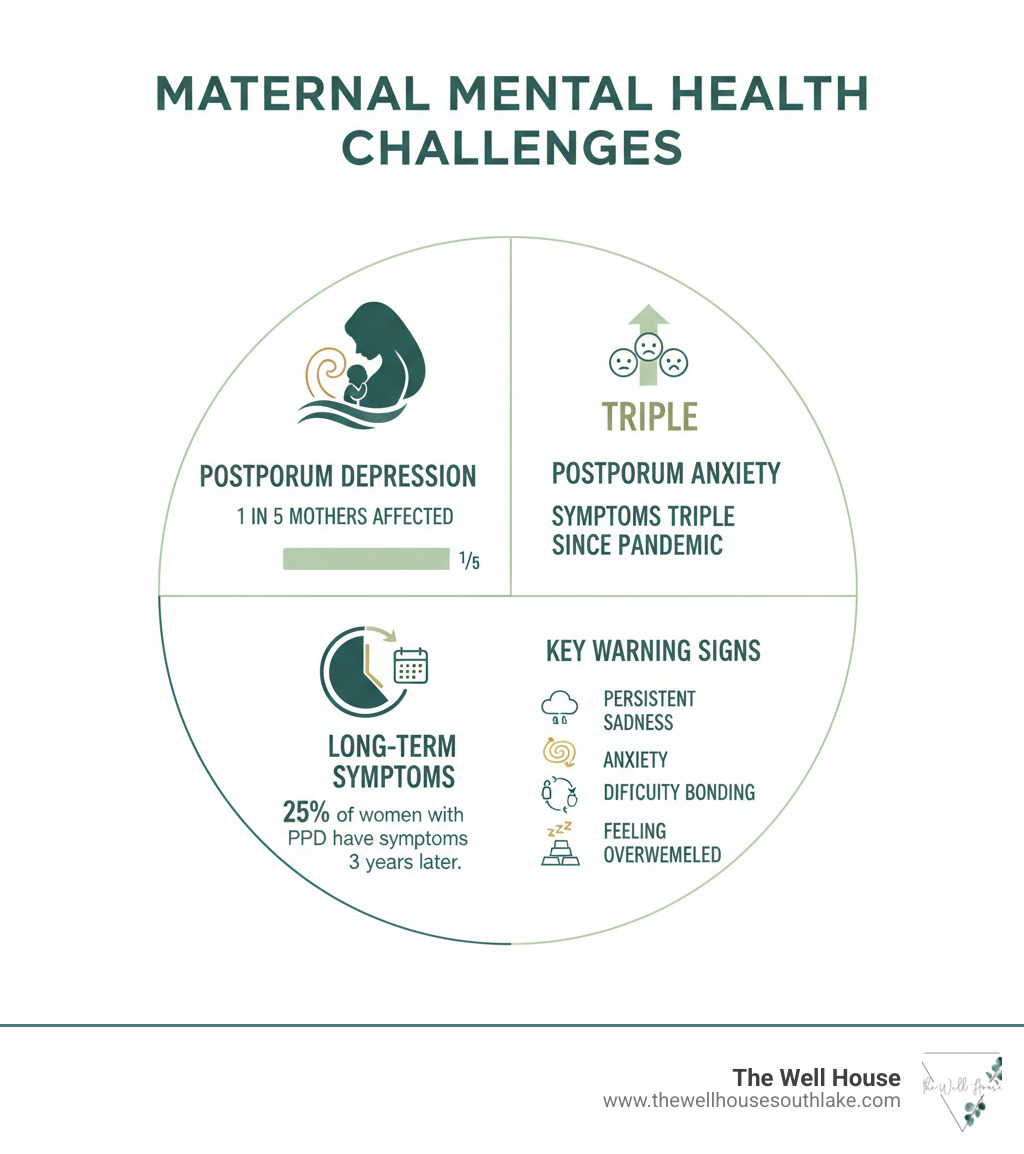Your Compassionate Guide to Mental Wellness for Moms
Why Every Mom Deserves Mental Health Support
Counseling for moms is specialized mental health support designed to help mothers steer the unique challenges of motherhood, from pregnancy through all stages of parenting. Here’s what you need to know:
What counseling for moms addresses:
- Postpartum depression and anxiety
- Identity shifts and role adjustments
- Relationship strain with partners
- Mom guilt, rage, and overwhelm
- Birth trauma and grief
- Work-life balance struggles
- Parenting stress and confidence
Types of support available:
- Individual therapy (in-person or online)
- Group therapy with other mothers
- Specialized approaches like CBT, EMDR, and mindfulness
- Couples counseling for relationship issues
- Support groups and peer connections
Motherhood is often called “matrescence” – a profound life transition that reshapes your identity, relationships, and inner world. Yet women are rarely prepared for its emotional upheaval. You’re not alone in struggling. Research shows that 46% of moms sought mental health therapy in the past year, and 1 in 5 mothers experience postpartum depression.
The pressure to be the “perfect mother” is built into our society, but seeking help isn’t a sign of weakness – it’s a sign of strength. As one mother shared: “I wish I would have found therapy sooner… My therapist has helped me see beyond that and finally feel like myself again.”
I’m Jennifer Kruse, a Licensed Professional Counselor Supervisor specializing in women’s issues and motherhood support through my soul-mind-body approach to healing. I’ve dedicated my practice to counseling for moms because I understand the transformative challenges of raising children while maintaining your own sense of self. Let’s explore how the right support can help you not just survive motherhood, but truly thrive in it.

Learn more about counseling for moms:
Why You’re Not Alone: The Hidden Mental Load of Motherhood
The Pinterest-perfect images of motherhood don’t show the 3 AM anxiety spirals or the weight of carrying everyone’s schedules in your head. They don’t capture what experts call the “invisible load” – that constant mental juggling act that leaves so many moms feeling exhausted before their day even begins.
This transition into motherhood – what researchers call “matrescence” – reshapes everything about who you are. Your identity, your relationships, even how you see yourself in the world. Yet somehow we expect women to steer this massive life change with little more than a baby book and best wishes.
Postpartum depression affects 1 in 5 mothers, making it more common than gestational diabetes. But it’s just one piece of the puzzle. Postpartum anxiety has actually tripled since the pandemic began, leaving many moms trapped in cycles of worry and “what if” scenarios that feel impossible to escape.
Then there’s “mom rage” – that intense anger that can feel scary and shameful. It’s not about being a bad mother; it’s often your body’s way of saying you’re overwhelmed and need support. Identity loss hits hard too, when you look in the mirror and wonder where “you” went in all of this.
The truth is, maternal mental health challenges are the most common complications of childbirth. More common than physical complications, yet we rarely talk about them with the same urgency or compassion.
Societal pressure doesn’t help. We’re expected to bounce back, juggle everything perfectly, and do it all with a smile. That pressure creates a gap between reality and expectations that can leave you feeling like you’re failing when you’re actually doing an incredibly hard job.
Our specialized Postpartum Support for Moms recognizes that sometimes motherhood really is overwhelming – and that’s okay. You’re not broken, and you’re definitely not alone.
Signs It’s Time to Seek Professional Support
Knowing when normal mom struggles cross into territory where counseling for moms could help isn’t always clear. The line between “this is hard” and “I need professional support” can feel blurry, especially when you’re in the thick of it.
Persistent sadness that lasts most of the day, nearly every day, goes beyond typical baby blues. So does irritability that has you snapping at people you love or feeling angry in ways that surprise you. When activities that used to bring you joy feel flat or pointless, that’s your mind asking for help.
Changes in sleep or appetite beyond what’s normal with a new baby can signal deeper struggles. Intrusive thoughts – especially scary ones about harm coming to you or your baby – are more common than you might think, but they’re also a clear sign that support would help.
Feeling disconnected from your baby or like you’re just going through the motions can be heartbreaking. Overwhelming guilt that tells you everyone would be better off without you is your brain lying to you – but it’s also a signal that you deserve care and support.
The hardest part might be when you find it difficult to ask for help or when you start pulling away from the people who care about you. These aren’t character flaws; they’re symptoms that respond well to the right kind of support.
If any of this sounds familiar, even if it feels manageable right now, reaching out early can make a huge difference. Many mothers tell us they wish they’d started therapy sooner, before things felt overwhelming. Check out our guide on What to Do When You’re Feeling Overwhelmed for immediate support strategies. For immediate, confidential help, you can also reach out to the National Maternal Mental Health Hotline, which is available 24/7.
Remember: seeking help isn’t giving up. It’s giving your family the gift of a healthier, happier you.
The Ultimate Guide to Counseling for Moms
Counseling for moms offers a dedicated space to process the myriad emotions and challenges that come with motherhood. It’s a place where you can be truly seen and heard without judgment, helping you steer the “bumpy labyrinth” of this profound life stage.
Common Therapeutic Approaches for Mothers
When considering counseling for moms, it’s helpful to understand that various therapeutic approaches can be custom to your unique needs. At The Well House, we believe in a collaborative, holistic approach, specializing in mind, body, and spirit wellness. Here are some common modalities we use:
| Therapy Type | Best Suited For… | How it Helps Moms |
|---|---|---|
| Cognitive Behavioral Therapy (CBT) | Negative thought patterns, anxiety, depression, coping skills development. | Helps you identify and challenge unhelpful thoughts like “I’m failing as a mom” and replace them with more balanced perspectives. You’ll learn practical tools for managing overwhelming emotions and developing healthier coping strategies for daily parenting stress. |
| EMDR | Birth trauma, difficult pregnancy experiences, processing traumatic memories. | Particularly effective for moms who experienced traumatic births, pregnancy loss, or NICU stays. EMDR helps your brain process these difficult memories so they no longer trigger intense emotional reactions, allowing you to move forward in your motherhood journey. |
| Mindfulness-Based Therapy | Overwhelm, staying present, reducing anxiety, emotional regulation. | Teaches you to stay grounded in the present moment rather than spiraling into worry about the future or guilt about the past. Perfect for busy moms who feel scattered, helping you find calm even in chaos and respond rather than react to challenging situations. |
| Couples Therapy | Relationship strain, communication issues, differing parenting styles. | Addresses how becoming parents has changed your relationship dynamic. You’ll learn to communicate needs clearly, resolve conflicts constructively, and work as a team while maintaining intimacy and connection as partners, not just co-parents. |
| Group Therapy | Peer support, feeling isolated, normalizing experiences. | Connects you with other mothers facing similar challenges. There’s incredible healing in realizing you’re not alone and hearing how other moms steer similar struggles. Group settings provide both support and accountability in a safe, understanding environment. |
Our Anxiety & Depression Counseling Southlake services incorporate these various approaches to meet your specific needs.
How to Find the Right Therapist for Counseling for Moms
Finding the right therapist can feel overwhelming when you’re already stretched thin. The most important factor is finding someone who truly understands the unique challenges of motherhood. Look for therapists with specialized training in perinatal mental health—those with PMH-C (Perinatal Mental Health Certification) have specific expertise in maternal mental health.
At The Well House, our therapist directory makes it easy to find someone who’s the right fit for you. Don’t be afraid to ask potential therapists about their approach. Do they understand the complexities of mom guilt? Have they worked with mothers experiencing similar challenges to yours?
Consider whether you’d prefer working with a Mom Therapist who has personal experience with motherhood. While it’s not necessary, many mothers find it comforting to work with someone who truly gets the daily realities of parenting.
Practical considerations matter too—location, insurance coverage, and scheduling flexibility are all important factors. Many of our therapists offer telehealth options, which can be a game-changer for busy moms.
The initial consultation is a two-way interview. You’re not just seeing if they can help you—you’re also determining if you feel comfortable and understood. Trust your instincts about the connection.
What to Expect from Your First Counseling for Moms Session
Walking into your first therapy session can feel nerve-wracking, especially when you’re already feeling vulnerable. Here’s what typically happens so you can feel more prepared.
You’ll likely start with some intake paperwork that covers your health history, current concerns, and what you’re hoping to achieve through therapy. This is your opportunity to share your story honestly—the sleepless nights, the overwhelming moments, the fears you haven’t voiced to anyone.
Your therapist will want to understand your specific goals. Maybe you want to feel less anxious about your parenting decisions, or perhaps you’re struggling to bond with your baby. There’s no concern too small or too big. This is your space to focus on yourself.
Building rapport takes time, and that’s completely normal. You don’t need to share everything in the first session. A good therapist will create a safe space where you can gradually open up at your own pace.
Don’t feel pressure to “fix” everything at once. Therapy is a process, and healing happens gradually. Some sessions might feel like breakthroughs, while others might feel like you’re just maintaining—both are valuable parts of your journey.
Feel free to ask questions about the process, their experience, or anything else that would help you feel more comfortable. This is about you getting the support you need and deserve.













